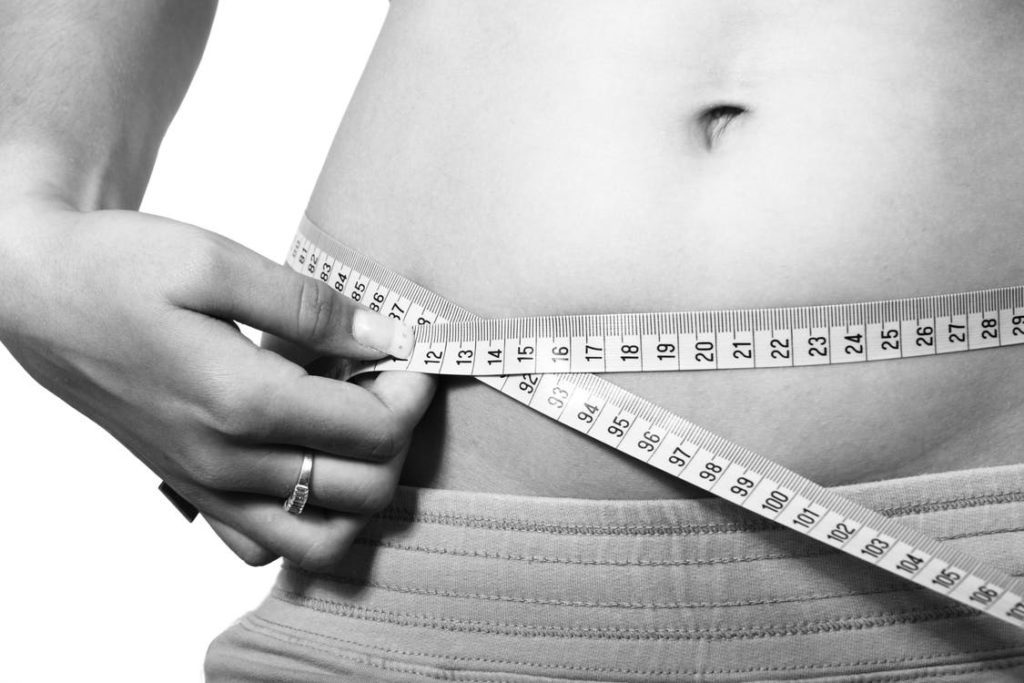
It’s never really gone.
A few days ago, as I was hurrying to a meeting, a man stepped in front of me to ask for change. Out of time, I smiled and nodded at him rather than stopping to give him money. Presumably angered, he yelled at me as I passed him — and long after. “Go eat some beans and rice or something and put some meat on those skinny a** legs! You’re so ugly! You’re so skinny you can hardly walk!” Shame and embarrassment washed over me as pedestrians craned their necks to see the target of his attention. After that feeling passed, something darker took its place. I felt a frightening tinge of joy.
A couple weeks before that incident, during a particularly stressful time at home and at work, I skipped lunch for a few days. It felt good. I felt like I was being productive and accomplishing more. But the real reason it felt good was because I had a sense that I was in control of my body and my schedule. I don’t need food. Food doesn’t control me. I control it. For a number of days, I had the desire to skip dinner, too.
These subtle, intrusive thoughts remind me all too often that even though I’m “recovered” and am at a healthy weight, anorexia never really goes away. It’s something I battle daily.
How it started
The onset of anorexia is different for everyone. There’s no formula to predict who will be afflicted. It’s caused by a combination of environmental, genetic, and situational factors. But often, it begins with a desire to be “a little slimmer” and turns into a complete obsession with every single thing that enters the body. I was a classic case.
I’d always been very slim, but like so many women, I put on the “freshman 15″ and was unhappy with how I looked. I’m a decidedly Type A personality and an only child — and I’ve always felt the weight of the importance placed on my performance. So I never felt better than when I could step up to the plate and succeed in academics, extracurriculars, etc. Putting on weight felt like failure. I hated how I looked. I felt unattractive and unloveable. I yearned for change, but it was difficult while adjusting to college.
My junior year, I started a diet. I was off and on but lost a bit of weight. I got a boyfriend. Life felt good. During my senior year, I got engaged and started planning the wedding. My coursework included all capstone classes and a competitive portfolio class that would determine my employability post-graduation. My mother and father were going through an exceedingly messy and violent divorce, with me squarely between the two. And my mother, who has long suffered from depression, was suicidal and lashing out. My life felt like it was more than I could manage. I was teetering on the edge, living in fear.
The one place I felt like I had complete control was food. So I restricted and restricted more, especially in times of extreme stress. I started logging every calorie I consumed. I counted gum (three calories), lettuce (five calories per cup), olives (seven calories), coffee (two calories). It was a good day if I ate 200 calories all day. A bad day if I ate as much as 350. My life became completely ruled by food. When I ate, where I ate, who I ate with — all had to be controlled. I didn’t go out to eat. I stood with anxiety at the salad bar wondering if the tomatoes were sitting in water or oil. It was debilitating.
At my thinnest, I was 87 pounds. I’m 5’6”.
It is difficult for me to detail the depth of my malfunction during that time of my life. I’m doing it now because eating disorders are so often misunderstood as an obsession with thinness. And it’s true that they often start that way. But ask anyone who has experienced it, and they’ll tell you that it morphs into an obsession with control. It’s all about numbers. Numbers on the scale. Numbers in your food. Your life is ruled by numbers, as you try to control your universe with them. Numbers determine your self worth.

“Recovery”
People who are “recovered” from addiction to alcohol or narcotics often describe themselves as addicts in the present tense, because it’s still something they struggle with. I know that for me, and for a lot of women, addiction to hunger is something we have to constantly manage in order to maintain our health.
My recovery only happened because my loved ones insisted on it. My fiancé and my parents gave me an ultimatum and forced me to see a psychologist. I hated them. I yelled at them. I swore at them. But they saved my life.
When I saw the therapist, I heard myself say, “I think I may have anorexia.” It was strange to say it out loud. We talked about how my body was feeling. I was losing my hair. My skin was itchy and dry. I was always cold, even in Texas in the summer. So cold that even on warm days, I would take a hot bath between classes just to warm up. I stopped menstruating. I noticed that sometimes my heart would race.
When the therapist and I talked about my health risks, the thing that stuck with me was that this disorder could permanently impact my fertility. My obsession with my control of food could prevent me from having children, even if I recovered. I left feeling scared, and knowing that I had to change if I wanted a family.
Through college, I continued to struggle. I got married the summer after I graduated, and two months after the wedding my husband and I moved abroad. When we settled down, I felt a liberating opportunity to start over. As I got away from the environment in which the disorder took root, I was able to banish the intrusive thoughts and damaging habits in a series of baby steps. The thing that helped most was the dream of starting a family one day, and what I might have been costing myself by severely restricting my food intake. And slowly, I got better. I gained weight. I had more energy. I was free to enjoy meals again.
But, while the intrusive thoughts and distorted feelings about food abated, they never really went away. I don’t know if they ever will. And that’s what motivated me to write this post.
Where’s the safety net?
Thankfully, there’s a lot of attention these days on eating disorder prevention and treatment in girls and young women. Rightly so. The statistics are startling and sad.
- Two-thirds of women between the ages of 18–25 say they would rather be mean or stupid than fat.
- 51% of 9- and 10-year-old girls feel better about themselves if they are on a diet.
- 42% of first-, second-, and third-grade girls want to be thinner.
- 46% of 9- to 11-year-olds are “sometimes” or “very often” on diets.
- 81% of 10-year-olds are afraid of being fat.
- 80% of all children have been on a diet by the time they reach fourth grade.
- 91% of women surveyed on a college campus had attempted to control their weight through dieting; 22% dieted “often” or “always.”
There’s no doubt that these disorders usually catch their victims early in life. About 90% of those who have eating disorders are women between the ages of 12 and 25, and anorexia is the third most common chronic illness among adolescents. But for all the buzz about the dangers of disordered eating in girls and young women, there’s a startling lack of thought given to what happens to those girls when they grow up? What happens when they have babies themselves? Why is it that when we become mothers, we’re expected to be whole again?
There’s a glaring gap in the healthcare system to prevent relapse in moms. Here are five reasons why I’m baffled there isn’t more attention paid to this health population:
1. Motherhood feels like losing control
Anorexia and her sisters are largely disorders about control. Can you imagine a time during a woman’s life when she feels less in control than during pregnancy and when her children are young? You can’t make children sleep. You can’t make them eat. You can’t make them do… almost anything. Life with children is chaotic at times, plain and simple. For ladies who can roll with the punches, that ends up being exhausting but, ultimately, fine. But for women who feel anxiety in a chaotic environment, such as many women with eating disorders, this time of life can trigger immense desire to control food intake to cope.
2. The media is obsessed with mothers’ weight
Hardly any group is targeted with more weight-loss messages than moms, which makes those of us with disordered eating histories extremely vulnerable. It seems like almost anything can be sold to moms if it promises to help us “get control of your weight” or “look slimmer” or “lose weight and feel great!” Those messages play into a dangerous narrative. Holly Grishkat, PhD, the site director for outpatient programs at the Renfrew Center, a foundation for researching and treating eating disorders, calls it the “Desperate Housewives” effect. “What we’re seeing now on TV shows where many of the actors are in their 40s but look like they’re in their 20s is the not-at-all-subtle message that not only can suburban mothers be thin and beautiful and youthful at any age — they should be.”
3. Mothers’ bodies change drastically, and often without our control
It’s not uncommon for women to gain 25-50 pounds during pregnancy. This weight fluctuation can cause anxiety in women with an eating disorder, even leading to the unbelievably sad condition that is exactly what it sounds like — pregorexia. While I’m so thankful I didn’t suffer with full-blown pregorexia with either of my two children, pregnancy weight gain was difficult for me. Seeing the numbers on the scale going up was scary. I almost obsessively kept track of how much weight I “should” have gained by “x” week of gestation given my starting weight. And then once the babies were born, I had an intense desire to instantly get back down to my starting weight, which caused me to restrict more than was healthy as a new mom.
4. Mothers often lose a sense of themselves
When kids come along, many families hunker down. Where there once were friends and hobbies and downtime, now there are children filling every crack of life. It’s far too common for moms to give up many of the core things that make them, them. Losing oneself is dangerous, and it’s a time when restrictive eating behaviors can be attractive. At my sickest, fasting allowed me to make myself smaller and smaller and smaller, and less and less consequential. Ultimately, I wanted to disappear.
5. Moms can lose perspective of what “going too far” looks like
There is so much pressure for moms today to do all and be all. To have a career, a happy family, be a good cook, look good in a tight dress, be a social activist, coach the kids in sports, be invested in their schooling, expose them to the arts, satisfy her partner, make a beautiful home. With all these expectations, what does “overdoing it” even look like? How does one know when one is “overdoing it”? Type A women (most at risk for eating disorders) are often chronic overcommitters. And feelings of disappointment and self-loathing are right on the other side of that coin, waiting to invite an eating disorder in to cope with the pain of perceived underperformance.
One sad realization I’ve had is how easy it would be to put supports in place for mothers who have struggled with eating disorders. When we get pregnant, the healthcare system is all over us. Aren’t there questions that our doctors can ask along the way to help us? What about our kids’ pediatricians? After all, children of parents with eating disorders are ultimately affected genetically and through modeling the parents’ behavior. Why don’t more people care about this?
My hope for the future
I don’t have any answers. I’m writing this to tell other women struggling that you are not alone. I want to advocate for better care for people like us by the system. This is something that needs to be talked about.
My biggest concern about the effects of my disorder is its potential to negatively impact my children. According to Eating Disorder Hope, the children of individuals with anorexia are 11 times more likely to have anorexia themselves and six times more likely to have some disordered eating behaviors. This is likely due to both genes and the modeling of eating disordered behaviors. This terrifies me. I never want them to go through the struggle that I did.
I realize that the best thing I can do for them is stay healthy myself, have a body-positive attitude in the home, encourage them to listen to their bodies, eat heartily, and place importance on what their amazing bodies can do, not what they look like.
REFERENCES:
- National Institute of Mental Health’s (NIMH) guide, Eating Disorders: Facts About Eating Disorders and the Search for Solutions
- Substance Abuse and Mental Health Services Administration, The Center for Mental Health Services, offices of the US Department of Health and Human Services
- Girl Power!, a public education program of the US Department of Health and Human Services.
- Gaesser, G. (1996), Big Fat Lies: The Truth About Your Weight and Your Health. New York: Fawcett Columbine.
- Mellin LM, Irwin CE & Scully S: Disordered eating characteristics in girls: A survey of middle class children. Journal of the American Dietetic Association. 1992; 92:851-53.
- (Collins, 1991). Collins M.E. (1991) Body figure and preferences among pre-adolescent children. International Journal of Eating Disorders, 199-208.
- (Gustafson-Larson & Terry, 1992). Gustafson-Larson, A., & Terry, R.D. (1992). Weight-related behaviors and concerns of fourth-grade children. Journal of the American Dietetic Association, 92, 818-822.
- Mellin LM, Irwin CE & Scully S: Disordered eating characteristics in girls: A survey of middle class children. Journal of the American Dietetic Association. 1992; 92:851-53.
- Kurth CL, Krahn DD, Nairn K & Drewnowski A: The severity of dieting and bingeing behaviors in college women: Interview validation of survey data. Journal of Psychiatric Research. 1995; 29(3):211-25.
- Public Health Service’s Office in Women’s Health, Eating Disorder Information Sheet, 2000. A young woman with anorexia is 12 times more likely to die than other women her age without anorexia. Mortality in Anorexia Nervosa. American Journal of Psychiatry, 152(7), 1073-1074.












